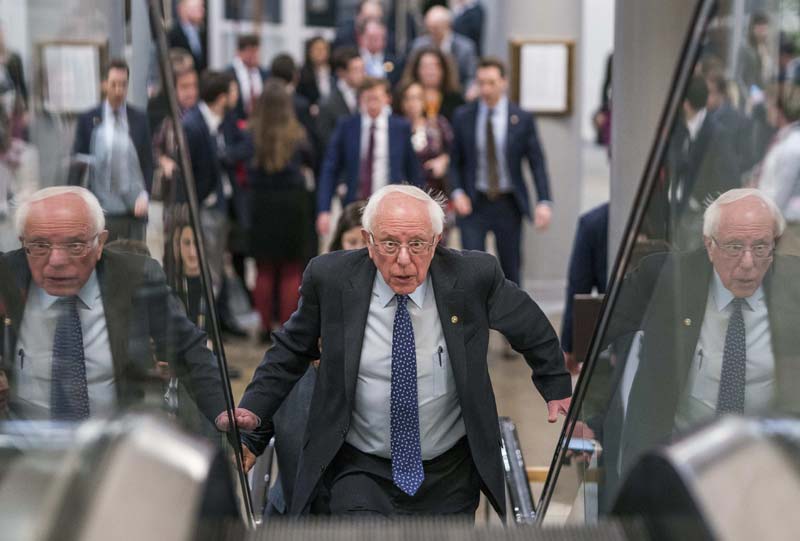 Melina Mara for The Washington Post
Melina Mara for The Washington Post
I interviewed more than two dozen people on Sunday at Bernie Sanders's first rallies in New Hampshire since he launched his 2020 campaign and was struck by how many of them supported Hillary Clinton in the primary last time but now seem inclined to back the democratic socialist.
Distaste for Trump has made a swath of party regulars and Democratic-leaning independents more open-minded about ideas and approaches that they dismissed as far-fetched and unrealistic not long ago.
"I used to think you have to be pragmatic. I just don't believe that anymore. A lot of it is because of Trump," said Brigid McNamee, 58, a librarian at a public school in Concord who voted for Clinton over Sanders in the 2016 primary. "I am so disgusted and outraged. I'm just disgusted by all the lies and corruption. It's mind-blowing every day what that man and his administration are doing."
McNamee swept her arm through the air as if she were pushing all the plates off a table onto the ground. She recently saw Sen. Cory Booker, D-N.J., speak at a meet-and-greet. He was nice and impressive, but she concluded his approach is insufficiently bold to heal the national wounds opened by Trump.
"I'm a more moderate person, but I feel compelled to support a revolution now because of him," she said. "It's got to be a revolution. That's the only way."
After watching Sanders speak for an hour in a Concord ballroom, her husband agreed. "You can't brush your teeth too many times a day to get rid of this [Trump] taste," said John King, 79, a retired teacher who also backed Clinton over Sanders last time. "The important thing to remember is this country was born in a revolution, and we need another one now. This time you don't need muskets. You need ballots."
Sanders bested Clinton by 22 points in the Granite State three years ago. Eleven months is an eternity in politics, especially during the fast-paced Trump era. A lot can - and will - change between now and next February. The 77-year-old benefits from high name recognition, but he cannot count on supporters staying loyal as fresher faces file through town. Bernie's inroads with folks who didn't support him in 2016, however, suggest that he has a genuine opportunity to broaden his appeal and credibly compete for the nomination despite persisting resistance from the party establishment.
Kimberly Pudlo-Schirmer voted for Clinton in the 2016 primary because she wanted to break the ultimate glass ceiling and elect a woman as president. She wore an "I'm with her" sweatshirt to Sanders's afternoon rally at a Courtyard Marriott near the State Capitol in Concord. But the 50-year-old said she won't vote for any of the women seeking the Democratic nomination in 2020. "I'm one of the 'hindsight is 20/20' people," she said. "I'm definitely going to vote for Bernie. I do like them all, but the only one I see who really understands the middle class is Sanders."
Pudlo-Schirmer said her job as a paramedic and her husband's ongoing fight against lupus have given her a firsthand window into the dysfunctional health-care system. Her thinking has changed in recent years, and she now believes the only tenable solution is Medicare-for-all. "There's a lot of really fractured stuff I see," the resident of Northwood said. "This would give a lot of people hope."
Mark King, a Democratic state representative from Nashua who volunteered for Sanders in 2016, said he was pleasantly surprised by how many fresh faces he saw on Sunday who weren't involved before. "I knocked doors for Barack Obama for a couple cycles, and this is different," said King, 56. "This is conceptually different. We're building a movement. It's truly beautiful."
Something working to Sanders's advantage right now is how many liberal activists - emboldened by the party's success in the midterms and the president's low approval rating - believe that basically any of their candidates could beat Trump next year. This is a debatable proposition, and Trump's team sees it as its ticket to a second term, but the mentality makes people more inclined to get behind the most ideological candidate who is promising the biggest change. Electability is less of a concern at this juncture than it might become if Trump's standing rebounds.
"When you live in an unprecedented moment, you need to have an unprecedented response," Sanders said in Concord. "That's what this campaign is about."
![]()
Despite a heavy snowstorm on Sunday morning that created whiteout conditions on the roads for a few hours, Sanders drew an impressive crowd of 850 in Concord and another 1,000 people to a late-afternoon rally at a theater on Main Street here in Keene.
He made only one passing reference to Clinton. "We won more votes from young people than Trump and Clinton combined," Sanders said, referring to the 2016 primaries.
But the senator, an independent who caucuses with Democrats, went on an extended riff about how many of the ideas he ran on before are now widely embraced by his 2020 rivals, from raising the national minimum wage to $15 an hour to Medicare-for-all, a trillion-dollar infrastructure package and repudiating support from super PACS.
"When we first came to New Hampshire in 2015 to campaign, we were 30 or 40 points behind in the polls," he said. "Further, the ideas that we were then talking about were considered by the establishment politicians and the establishment media as just too radical."
Doing an impression of his critics, Sanders said they would ask him: "Bernie, what are you smoking?"
"And that is another issue that was considered to be too radical," he continued, making a tongue-in-cheek reference to his early support for legalizing marijuana and ending the war on drugs.
He led the crowds in a call and response, saying an idea and the crowd yelling, "Too radical!" Then he argued at length that none of these ideas should be considered radical, from creating a universal pre-K system to making public colleges tuition-free or creating a federal jobs guarantee. "It's hard for me to imagine that anybody thinks it's a radical idea to take good care of our children," he said. "It's not a radical idea."
"It is not a radical idea" was his refrain.
Sanders isn't wrong that many Democrats have come his way on these and other issues. Several 2020 candidates, in fact, have based their campaigns on the assumption that they can co-opt his agenda and poach his followers by slightly repacking his ideas as their own. Most of them have moved leftward since 2016, racing to catch up with the grass roots.
The senator is already facing attacks from his left flank that he never had to worry about in 2016. Julián Castro, the former HUD secretary who is waging a long-shot presidential campaign, slammed Sanders on CNN's "State of the Union" yesterday for opposing reparations. "What he said on 'The View' the other day was that he didn't think the best way to address this was for the United States to write a check," Castro said, referring to the legacy of slavery. "It's interesting to me that, when it comes to Medicare-for-all, the response there has been, 'We need to write a big check.' When it comes to tuition-free or debt-free college, the answer has been, 'We need to write a big check.' . . . And so, if the issue is compensating the descendants of slaves, I don't think the argument about writing a big check ought to be the argument that you make - if you're making an argument that a big check needs to be written for a whole bunch of other stuff."
Make no mistake, Sanders is not moderating. He remains a pitchfork-wielding populist as much as ever and fluently speaks the language of class warfare. In his speeches yesterday, he promised to wage total war against a dizzying array of powerful interest groups, from big banks to private prisons and large tech companies. Sanders said he'll go after insurance companies to create universal care, the pharmaceutical lobby to lower drug prices, defense contractors to unravel the military-industrial complex, oil companies to combat climate change and big agribusinesses like Monsanto to help family farmers.
At times, Sanders speaks as if these deep-pocketed interests collude in the shadows to suppress the proletariat. He believes a popular movement, bigger than any single campaign, is needed to neuter them. "They are the 1 percent," he said. "We are the 99 percent."
"Let them feel the Bern," a man yelled from the crowd.
Sanders then noted that he raised more than $10 million from small-dollar donors during his first week as a candidate, with an average donation of around $25, and added that 1.1 million people have already signed up online to volunteer for his 2020 campaign. He walked offstage to John Lennon's 1971 "Power to the People."
Unlike most of his Democratic opponents, who are trying to introduce themselves to voters on their own terms, Sanders makes attacking Trump a pillar of his stump speech. He said the president and "the billionaires" who support him "have had some success . . . dividing us up." He said "kleptocracy and greed" have been animating principles for the administration. The senator predicted that these forces will spend hundreds of millions of dollars to stop him from winning the White House and to thwart his agenda. "They use that money to buy politicians," he said. "Are you ready to get involved in that struggle? This is not just rhetoric."
![]()
Sanders, who is from neighboring Vermont, leaned heavily on his home-field advantage during the first foray of the year into New Hampshire. He noted that he has four children and 7 grandchildren, three of whom live in New Hampshire. "I know that we New Englanders are hearty souls, but we didn't expect this many people," he said, referring to the snow. "We in New England have a heritage we are very proud of, and I'm not talking about the Patriots."
Several folks I spoke with in Keene were longtime Bernie fans who drove in from Vermont or Massachusetts. They can't vote in next February's first-in-the-nation primary, but they're eager to knock doors. It's hard to guess how many people in the large crowds came from outside the state.
Brooke Hanson, 28, used to be a teacher. Now she works in the cannabis industry. She lives in New Bedford, Massachusetts, but braved the snow to see Sanders at both of his rallies on Sunday. She drove up here four years ago to cheer him on as well. "People were laughing at a lot of what he said back then," Hanson recalled. "They're not 'crazy' ideas anymore. Now they're common sense."
Sign up for the daily JWR update. It's free. Just click here.
(COMMENT, BELOW)


 Contact The Editor
Contact The Editor
 Articles By This Author
Articles By This Author